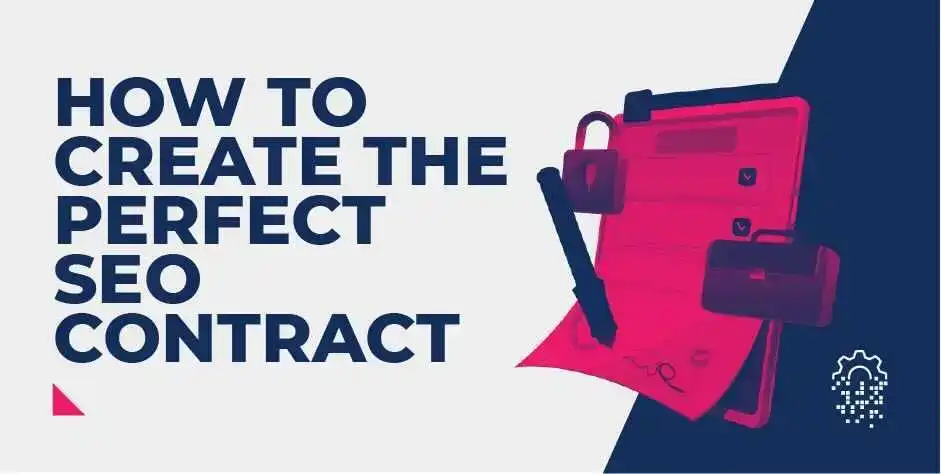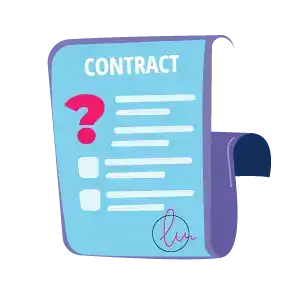
How To Create The Perfect SEO Contract
Once you decide to work with an SEO agency to improve your business’s online visibility, you want to do everything you can to ensure that your expectations of one another are clear and certain, from what needs to be paid and when right through to what specific services you will be provided with, and what to do if you experience substandard results.
With an increasing number of agencies and individuals offering unethical and lazy SEO solutions for businesses or misrepresenting what they can do, it has never been more important to have your expectations in writing. That’s where a contract for SEO services comes in, offering you and your business legal protection and greater peace of mind.
What is an SEO contract?
 Put simply, an SEO contract is a legal agreement outlining the rights and responsibilities of different parties involved in the provision of an SEO service. At a very basic level, for a contract to be legally binding, the document needs to involve a clear offer of certain deliverables under certain conditions, so the contents of your SEO contract is incredibly important.
Put simply, an SEO contract is a legal agreement outlining the rights and responsibilities of different parties involved in the provision of an SEO service. At a very basic level, for a contract to be legally binding, the document needs to involve a clear offer of certain deliverables under certain conditions, so the contents of your SEO contract is incredibly important.
Getting the SEO contract right is crucial to protecting your business, your expectations and your relationship with the service provider. But what does a robust SEO contract entail and why is it so important?
Why do you need a contract?
The most obvious reason for creating a contract is to clearly outline what is expected of you and the business you are dealing with and hold both parties to the responsibilities agreed upon. It is an opportunity to clearly communicate expectations between the party, break down any fees, outline a step-by-step SEO strategy and eliminate any confusion or miscommunication early on, hence why it is so important to include as much information as you feel is necessary to your dealings within the document before it can be signed.
There is often an opportunity for parties to negotiate contract terms, whether based on timings, pricing, or even KPIs. Your SEO contract can be relatively flexible depending on what the client and agency agree on, however, you should bear in mind that flexible contract terms often fail to provide adequate protection to parties, especially if you decide to sue your SEO agency later down the line for misrepresentation or breach of contract.
A strong SEO contract will:
-
Protect you from over-generous and under fulfilled promises by an SEO expert.
-
Ensure timely delivery of certain services and responsibilities.
-
Prevent you from being charged more than you initially planned for the service.
-
Provide remedies for you in the event of harm, or negligence.
If you are looking to draft or review an SEO contract, you may find our SEO contract template useful.
10 important components of any SEO contract
1. The basic information about the parties and relationship
 As with most contracts, the first element of an SEO contract will be the introductory section which clearly outlines the titles, addresses, and relationships of each party to the deal/contract. For example, an introductory section may read like this:
As with most contracts, the first element of an SEO contract will be the introductory section which clearly outlines the titles, addresses, and relationships of each party to the deal/contract. For example, an introductory section may read like this:
This agreement is hereby entered into between [Party 1’s Company Name] hereinafter referred to as ‘we’, ‘us’, ‘our’, and [Party 2’s Company Name] hereinafter referred to as ‘client’, ‘you’, ‘him’, ‘they’ on [Insert Date and Time] with offices at: [Party 1’s Complete Physical Address] and [Party 2’s Complete Physical Address].
2. Clarification of contract duration
 The contract duration will also need to be outlined within the document, as well as certain deadlines for deliverables throughout this period. In particular, it is vital to have a definite date of when the contract will take effect and when the terms become enforceable and how frequently these will be renewed.
The contract duration will also need to be outlined within the document, as well as certain deadlines for deliverables throughout this period. In particular, it is vital to have a definite date of when the contract will take effect and when the terms become enforceable and how frequently these will be renewed.
When deciding on your SEO contract duration, you should consider the following things:
-
Is the contract for a one-off project or a series of ongoing efforts? If it is for a one-off, single project, then you will find that finite contracts that clearly define a start and end date are most applicable.
-
How often would both parties like the contract to be renewed? Most commonly, businesses elect to renew contracts with their SEO agencies monthly, quarterly or annually, depending on their personal goals and requests.
Owing to the long-term and sustained nature of SEO strategies, you will often find that auto-renew contractual agreements are preferred. This gives a sufficient amount of time for parties to recognise and reap the results of SEO.
Likewise, as SEO results are not instantaneous, you should expect most reputable SEO agencies to have minimum contract duration terms, since they take pride in their work and know that rushed results aren’t always sustainable.
3. Specific deliverables and KPIs
 Arguably the most significant element of a contract is the promises made and the results offered by an agency to a business, since this is the whole selling point of the service. Clients are most interested in what an agency’s work will do for their business, so this is usually an opportunity for agencies and freelancers to showcase their technical skills and expertise.
Arguably the most significant element of a contract is the promises made and the results offered by an agency to a business, since this is the whole selling point of the service. Clients are most interested in what an agency’s work will do for their business, so this is usually an opportunity for agencies and freelancers to showcase their technical skills and expertise.
Some common examples of deliverables that you might expect to see contained in an SEO contract include:
-
Keyword research and analysis for a specific number of keywords and phrases.
-
Competitive analysis for certain main keywords.
-
Analysis of the client’s website architecture, HTML, page design, and linking structure.
-
Recommendations and modifications to optimise specific aspects of the content, page text elements, page titles, meta tags, and external links to the site (usually an outlined number of each).
-
More specific consulting and reporting services, as well as the frequency of these.
However, you can expect also to see these responsibilities outlined in terms of billable hours as well, along with an agreed hourly rate. One thing that is important to remember throughout is that if you are suspicious of or concerned about the ethics and practicability of any terms outlined, you should press on these for guarantees and remain guided by your business’ values, ethics and moral code - particularly when it comes to black hat tactics being offered by an agency, since these can ruin your reputation and subject you to costly penalties later down the line. Therefore, we recommend ensuring that there is a clause inserted within the contract that guarantees full compliance with search engine guidelines and the best industry practice.
When drafting or proofing an SEO contract, it is also important to ensure that the timing of these deliverables is clearly outlined too. For example, you need to specify the time and date of certain deliverables being carried out and achieved, and outline each phase of these and the expected completion date for each KPI you have agreed upon.
4. Established roles
 As is to be expected, clients are often keen to know who will be delivering each aspect of the work and how it will be accomplished, so it is important to get clarity on this, especially if the agency you are contracting with outsources some of their work. If it is not contained already, you may want to ask the SEO agency to provide clear information, in writing, about certain points, including but not limited to:
As is to be expected, clients are often keen to know who will be delivering each aspect of the work and how it will be accomplished, so it is important to get clarity on this, especially if the agency you are contracting with outsources some of their work. If it is not contained already, you may want to ask the SEO agency to provide clear information, in writing, about certain points, including but not limited to:
-
Who will be handling the campaign, and are they trained?
-
Do you outsource any work to other businesses or freelancers (e.g subcontracting)
-
What oversight procedures are in place to prevent liability?
-
Are you able to meet strict confidentiality agreements and clauses as a result?
5. Client responsibilities
 When it comes to an agency-client relationship, you should also be aware of the fact that you have a few (often minor) responsibilities too, such as:
When it comes to an agency-client relationship, you should also be aware of the fact that you have a few (often minor) responsibilities too, such as:
-
Granting credential access to your online properties, including for analysis and tracking purposes.
-
Offering access to the backend of a website for the purposes of analysis and optimisation.
-
Providing up to date and high-quality logos used for your business.
-
Authorising the use of client photos, logos, trademarks and other content.
-
Complete a thorough intake form with your business details.
In ensuring that you can abide by these responsibilities, you can support the successful delivery of SEO services for your business.
6. Asset ownership
 As is the case with most digital marketing and creative industries, it is often also useful to define who owns certain deliverables and results after they have been created, and how any ownership will be transferred as part of this. In this section of the SEO contract, you may want to ensure that the following information is specified:
As is the case with most digital marketing and creative industries, it is often also useful to define who owns certain deliverables and results after they have been created, and how any ownership will be transferred as part of this. In this section of the SEO contract, you may want to ensure that the following information is specified:
-
Who will have permission to use and share the content and assets? Will the rights be exclusive?
-
How will the assets’ ownership be transferred?
-
Who owns which aspects of the asset, if not exclusively held?
-
Who acquires liability for the assets, if liability arises?
7. Terms of payment
 Of course, as with any service, SEO deliverables will come at a cost. Usually, this cost is defined early on in the discussion stages between the client and SEO agency, however, you should always look for smaller details and contingencies within the SEO contract that may trip you up later down the line, or cost you more than you anticipated.
Of course, as with any service, SEO deliverables will come at a cost. Usually, this cost is defined early on in the discussion stages between the client and SEO agency, however, you should always look for smaller details and contingencies within the SEO contract that may trip you up later down the line, or cost you more than you anticipated.
Terms of payment may include:
-
What billing method will be used to take the payment from you.
-
When the payment is due to be taken and how much is due.
-
The nature of billing (e.g flat rate, blended rate, revenue share).
-
The proportion of the cost to be paid - for example, will you pay for the year upfront?
-
Any additional payment requests or terms - such as advance payments, late payment penalties, and surcharges.
Advance payments
Advance payments are commonplace within the creative industry since not only do they alleviate the stress of late payments, but they also ensure that there are sufficient resources to perform the task and assure the agency that payment obligations will be fulfilled if the work is done. This is important since, unlike businesses that have tangible stock that can be resold if returned or not purchased, SEO work is highly personalised to a certain business, and wasted hours are costly. When reviewing your SEO contract, you might expect to see a billing schedule where payments are due ahead of time, deposit procedures and specific percentages of advance payment required before work can proceed.
However, you should also seek clarification in the contract as to what percentage of work will be fulfilled as a result of an advance payment, since this offers you protection too.
Late payment penalties
Like advance payments, late payment penalties are also an industry commonality - and rightfully so. Like most businesses, late payments can cause SEO agencies plenty of stress and disruption, so penalties are enforced to discourage late payments and ensure a robust cash flow. You should pay close attention to these and ensure that you can afford to meet payment deadlines and avoid late payment penalties.
Surcharge fees
Often, many businesses will opt for extras as part of their relationship with an SEO agency, and how these will be invoiced and what they will cost will either need to be accounted for in the original contract or as a part of an entirely separate one.
8. Pausing and early termination
 Another factor that should be considered within your SEO contract is the circumstances upon which the contract and services can be terminated earlier than the outlined end date, or even paused.
Another factor that should be considered within your SEO contract is the circumstances upon which the contract and services can be terminated earlier than the outlined end date, or even paused.
Contract pausing
Whilst many digital marketing agencies will not offer contract pauses, some others might as part of a more flexible dealing. However, you will need to be clear about what a contract pause entails, the circumstances under which it can be paused, the notice required and what the pausing process involves. Illustratively, during the pandemic, we decided to allow clients to pause their contracts as the situation that had unfolded was out of both parties’ control. However, pausing is often not preferred by agencies, and even if it is, you will need to comply with a complex set of terms or negotiate your own.
Terminating a contract
There should also be a section of the contract which outlines any early termination rules. Usually, a contract can be ended either through mutual agreement or a breach of the contract terms contained. Whilst these circumstances appear fairly straightforward, the process of terminating the contract is often more complicated, so the termination clauses need to establish the terms that need to be followed by both parties upon ending the contract.
Common reasons for termination may include:
-
Unmet financial obligations
-
Poor contract execution by either party
-
Insufficient results
-
Unworkable relationships
-
A dramatic shift in circumstances
However, for these options to be available to both parties, an early termination clause needs to:
-
Make clear what circumstances early termination will be allowed in
-
Outline the required amount of notice to end a contract
-
Outline what nature of notice needs to be provided (e.g written or verbal)
-
Disclose what details must be provided within the notice
-
Discuss the transition process for when the contract halts
-
Describe what will happen to fees (paid or unpaid) after the notice
9. Further agreements
 If you have any additional contentions or concerns, you may also want to ensure they are provided within the SEO contract. This can be anything from the ownership of creative assets to what happens if a certain key member of either team leaves their role.
If you have any additional contentions or concerns, you may also want to ensure they are provided within the SEO contract. This can be anything from the ownership of creative assets to what happens if a certain key member of either team leaves their role.
Essentially, this is an opportunity for you to discuss unique contingencies that matter to you with the agency and see what deal they are willing to come to on these things. If you can reach an agreement on these terms, you should write these terms into the contract.
Another example of clauses that are commonly inserted into contracts is confidentiality clauses, which declare that all information and communication be held strictly in confidence. Alternatively, this section might outline the relationships with third parties and the conditions of these.
10. Dispute resolution and legal venue
 The legal “stuff” is usually crammed into the end of the contract but is essential nonetheless. It will often add provisions that outline steps in dispute resolution or how the parties will navigate any issues that might arise.
The legal “stuff” is usually crammed into the end of the contract but is essential nonetheless. It will often add provisions that outline steps in dispute resolution or how the parties will navigate any issues that might arise.
In particular, you can expect to find the following in this section of an SEO contract:
-
Steps for resolving disputes between both parties
-
The timeframe for resolving disputes between parties
-
Subsequent actions where resolutions cannot be reached by the parties
-
What state laws the agreement should be governed in accordance with
-
The applicable legal venue
Our biggest advice is for businesses to seek legal help from a qualified solicitor, at least with this part of the contract. This is because, whilst legal oversight can be pricey, the cost of a contract gone wrong for SEO work, or the cost of incurring liability is often far greater, so recruiting legal support is well worthwhile.
Our advice when drafting an SEO contract
At Reboot, we do everything we can to ensure that our clients are confident in our abilities, responsibilities and results as an agency, so we know exactly what it takes to draft an SEO contract that looks after both parties and offers as much protection as possible.
Here are some tips to follow when drafting an SEO contract:
1. Ensure that contract terms are sufficiently precise to ensure there is no confusion or ambiguity as to what they mean.
2. Recognise that certain results are not guaranteed within SEO, such as certain rank positions, no matter how desirable they are. SEO is a fast-moving, dynamic industry and change is rapid. Therefore, you should consider this when outlining KPIs, and be wary of agencies that over-promise.
3. Take the opportunity to negotiate contract terms where you feel it is necessary to do so. Remember that every business is different and so will need a distinct set of results and services. Do your research on the services you are being offered so that you are negotiating from a position of strength, not weakness.
4. Consider how workable the relationship with a particular agency is. For example, if you are struggling to negotiate terms that work for both parties early on due to different values or expectations, you may find these patterns repeating themselves throughout your dealings. Above all else, you want to find a trustworthy SEO company.
5. Always seek assistance from a legal professional, even if it is just to review the contract with your interests in mind. They will help you cut through any legal jargon and highlight any problematic clauses.
Please note that this article is not to be treated as legal advice, but merely as an insight into the topic.
